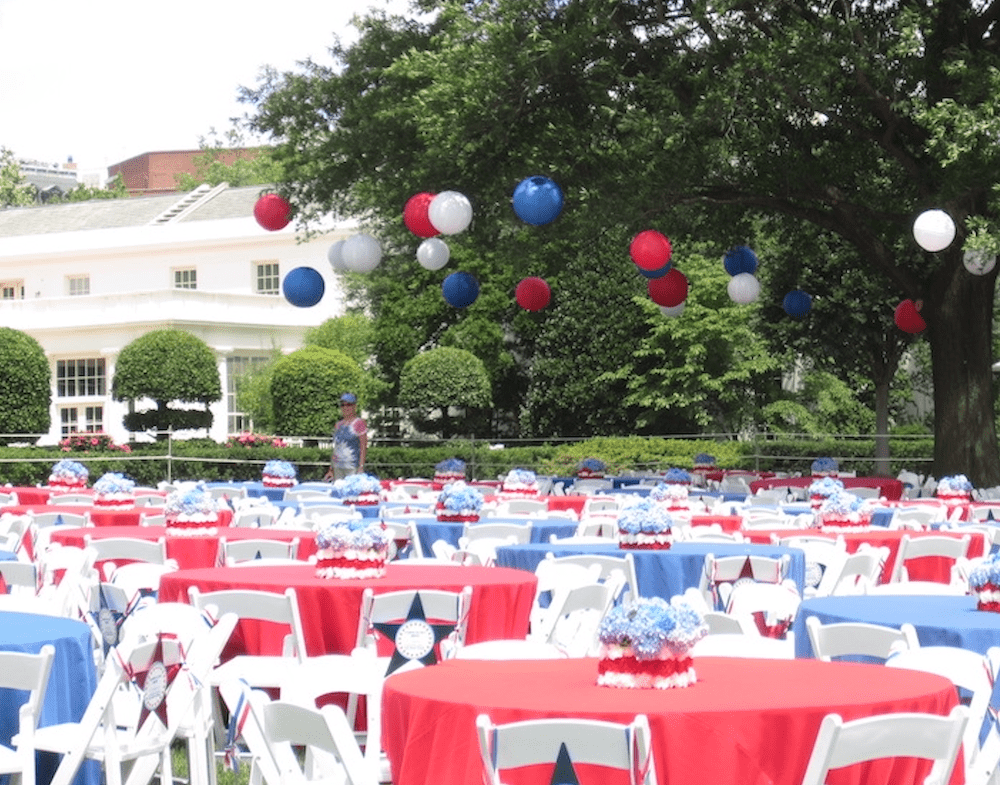
New Bill Being Introduced for U.S. Grown Flowers at Federal Events
Considering that less than 25 percent of the flowers used and loved in the U.S. are domestically produced, a bipartisan bill called the American Grown Act (AGA) is being introduced to Congress this month to encourage some official government events to gather beautiful blooms solely from American farms.
A great idea right?
When you think about it, shouldn’t the wreath and flowers that serve as a symbol for comfort and sacrifice at the Tomb of the Unknown Soldier be domestically created for such a solemn and patriotic event?
The bill is being submitted by Senator Dan Sullivan (R-AK) and Rep. Don Young (R-AK) to support American flower and foliage farmers. Sullivan, who hails from Alaska which is full of peony farms, was in the United States Marine Corps from 1993-1997 as well as in 2009 and 2013.
This article was originally written for FlowerPowerDaily.com by Jill Brooke
“The bounty and beauty of cut flowers know no boundaries nor political affiliation and this is a way for our leaders to support American farmers,” explains Camron King, the CEO of Certified American Grown, noting that consumers spend almost $27 billion per year on floral products. “Calling upon certain federal agencies to procure and display only flowers and foliage grown here in the United States is an important step to recognizing the work of our farmers and businesses.”
As it turns out, most of the flowers at official events are from South America, Europe and Africa.
The timing couldn’t be better for this to pass for several reasons.
It is an opportunity for bipartisan support since flowers are universally loved by all demographics, age groups and their symbolic meanings and relevance don’t trigger controversy.
Furthermore, because of the pandemic, there are 20 million new gardeners as well as a surge in people considering farming flowers as an alternative career or passion, especially with Generation Z and millennials.
Last but not least, July is American Grown Flowers Month, so perfect timing to introduce the bill.
Among the many who consider this a worthwhile consideration is Laura Dowling, who was the White House Chief Floral Designer from 2008-16 under the Obama administration and is also the author of “Floral Diplomacy.”
“It not only highlights the importance of American and organically grown flowers, sending a powerful message of support to environmentalists, gardeners and growers – it further strengthens the ability of flowers to convey nuanced messages of hope and unity, highlighting the resilience and power of the American spirit,” she says.
“I saw firsthand the special place of flowers as a symbol of American patriotism and a tool for diplomacy. Flowers became much more than decorative elements – they truly encompassed a larger mission, conveying a sense of national pride and inspiration emblematic of the American ideal.”
The bill is careful to be realistic about specific places where the all-American flowers would be mandated, earmarking, for now, State Department and Defense Department areas.
After all, organizers for White House events routinely incorporate the culture of visiting dignitaries and heads of state in menus and decor.
And historically, flowers have been a healing source of cultural connections and diplomatic pollination. The cherry blossoms growing in Washington D.C. were a gift from Japan to the U.S. spearheaded by First Lady Nellie Taft, Iwa Chinda of Japan, and Eliza Ruhamah Scidmore to “signal friendship between the U.S. and Japan.”
However, roses, which became a national flower by Ronald Reagan in 1986, need not be from Colombia considering that California produces dazzlers, as does Floret Flowers in Skagit Valley, Washington and the world’s best selling rose invention in history, the Knock Out rose distributed by Star Roses and Plants, was created by Wisconsin’s Will Radler. For flower displays at meetings, surely American grown can be found easily.
The bill will hopefully create a shift in thinking and raise awareness to help American flower growers, who in recent years are creating extraordinary blooms ranging from lilacs in Maine, dahlias in Michigan or zinnias from Texas.
And who can not be moved by the image of generations of immigrants mustering up the courage to leave their countries for a better life and clutching seeds from their previous gardens to grow in their new homeland. The seeds eventually became “native” flowers like daylilies and clover that have become quintessentially American in all its multi-cultural glory.
“The importance of supporting our domestic farms cannot be understated, as purchases of American flowers equates to supporting families, employees, communities, and the overall significance of ensuring that our domestic farms can continue for generations to come,” adds King.
Part of the reason that South America in particular has had an advantage is because of U.S. policy worrying about the threat of communism and then later drug trafficking. In. 1961, the U.S. Agency for International Development helped Colombia’s flower industry prosper, and thirty years later, Congress offered duty-free access to flowers from Bolivia, Ecuador, Peru and Colombia to motivate farmers to cultivate legal crops.
American flower growers are hoping that to even the playing field, this bill would encourage consumers to also ask for Certified American Grown flowers along with also purchasing their prized Dutch tulips and specialty blooms.
Slow Flower Movement founder Debra Prinzing, who started #Americanflowersweek in 2015 prior to Certified American Grown’s campaign which primarily works towards legislation initiatives, points out that her inspiration came from the British Flowers Week campaign.
“And now Canada is planning on doing something similar,” she says. “We now have so many talented flower growers domestically and want to support them and raise awareness of what they are doing.”
Camron King of Certified American Grown is optimistic that this American Grown Act (AGA) bipartisan bill could root at this moment of time and is hopeful that once submitted, the public will reach out to their local state representatives to support it.
After all, there are specific events when the flowers should be made in the U.S.A.

For Dowling, a memory comes to mind when she asked Gold Star family members to help create seven Presidential Memorial Day wreaths at the White House. A family pondered whether their 19-year-old son who died in Afghanistan was too young to have “made an impact in life or the battlefield.”
“In hushed tones, I heard them say that it was important for every Gold Star family member to touch the floral wreath that the President’s own hands would touch as he laid the wreath at Arlington Cemetery,” she recalls. “At one point, each family member silently placed a symbolic flower on the largest wreath, the one that the President personally places at the Tomb of the Unknown Soldier. The flowers represented the faces of all fallen heroes, ensuring that they would indeed never be forgotten.”
So perhaps for these types of events, the impact of American flower growers should not be forgotten either and be incorporated for national holidays and events. It is why we at flowerpowerdaily hope this bill roots and elevates the respect and professionalism of so many talented floral growers around the nation.

By Jill Brooke is a former CNN correspondent, Post columnist and editor-in-chief of Avenue and Travel Savvy magazine. She is an author and the editorial director of FPD and floral editor for Bedford New Caanan magazine and Aspire Design and Home magazine.
Photo Credit: Laura Dowling
Related Articles
AFE Announces Annual Investment Report
The American Floral Endowment has released the 2024-2025 Annual Report, capturing a year of momentum, innovation, and industry-driven impact. The report illustrates how collective investment from across the floral community is fueling research, education, and...
Smithers-Oasis Appoints Mickey Leech as President, North America Operations
Kent, OH – Smithers-Oasis is proud to announce the appointment of Mickey Leech as President, North America Operations, effective December 1, 2025. Mickey joins the President’s Staff, reporting directly to Robin Kilbride, President and CEO of Smithers-Oasis. Mickey...
IPM ESSEN Trade Fair Includes The Spirit of Aloha in 2026
Sacramento, CA – From 27–30 January 2026, IPM ESSEN, the world’s leading trade fair for horticulture – will bring together the global horticultural industry under one roof. Within this dynamic environment, The Spirit of Aloha invites attendees to step into the vibrant...






















